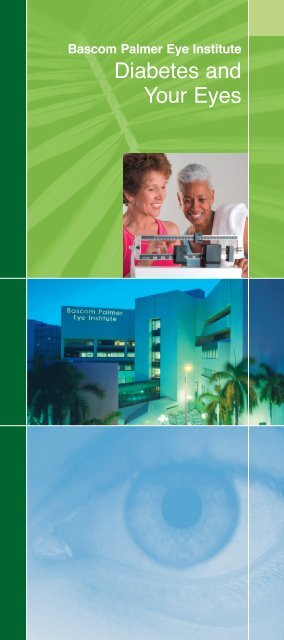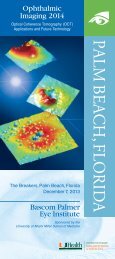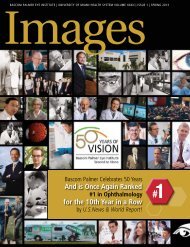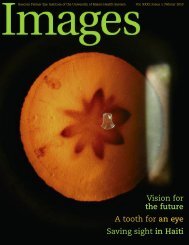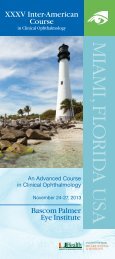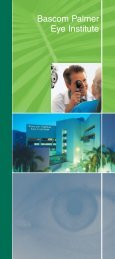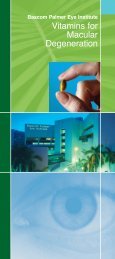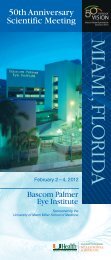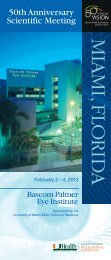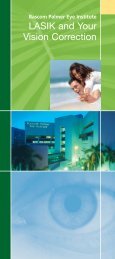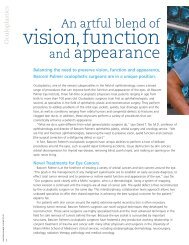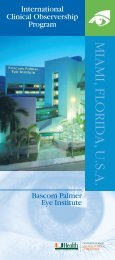Diabetes and Your Eyes - Bascom Palmer Eye Institute
Diabetes and Your Eyes - Bascom Palmer Eye Institute
Diabetes and Your Eyes - Bascom Palmer Eye Institute
You also want an ePaper? Increase the reach of your titles
YUMPU automatically turns print PDFs into web optimized ePapers that Google loves.
<strong>Bascom</strong> <strong>Palmer</strong> <strong>Eye</strong> <strong>Institute</strong><br />
<strong>Diabetes</strong> <strong>and</strong><br />
<strong>Your</strong> <strong><strong>Eye</strong>s</strong>
<strong>Diabetes</strong> <strong>and</strong><br />
<strong>Your</strong> <strong><strong>Eye</strong>s</strong><br />
A person with diabetes is at risk for<br />
developing diabetic eye disease, the<br />
leading cause of blindness in young <strong>and</strong><br />
middle-aged adults today.<br />
Diabetic eye disease may include diabetic<br />
retinopathy (damage to the blood vessels<br />
in the retina), cataracts (clouding of the<br />
eye’s lens), or glaucoma (increase in<br />
fluid pressure inside the eye that leads to<br />
optic nerve damage <strong>and</strong> loss of vision).<br />
There is a lot you can do to take charge<br />
<strong>and</strong> prevent such problems.<br />
Diabetic eye disease may be present<br />
even if your vision is normal <strong>and</strong> you<br />
have no pain.<br />
If you have diabetes, we recommend<br />
that you get a dilated eye exam with your<br />
ophthalmologist at least once a year.<br />
High blood glucose can damage your<br />
eyes as time goes by. The longer you<br />
have diabetes, the greater your risk of<br />
developing diabetic eye disease. More<br />
frequent eye examinations may be<br />
necessary after eye disease is diagnosed.<br />
Prevention is Everything<br />
Know <strong>Your</strong> ABCs:<br />
A Hemoglobin A1C test for<br />
average Blood Glucose<br />
This is a blood test that your medical<br />
doctor checks regularly to measure<br />
the overall control of your diabetes.<br />
The A1C is the most important test<br />
to prevent diabetes damage to the<br />
eye, heart <strong>and</strong> kidneys. Ask what<br />
your number is at your next appointment.<br />
Keep your hemoglobin A1C<br />
under 7.<br />
B Blood pressure<br />
Controlling blood pressure reduces<br />
your risk of diabetic eye disease as<br />
high blood pressure can damage<br />
your eyes. Make sure your blood<br />
pressure is under 130/80.<br />
C Cholesterol<br />
Keep your total cholesterol number<br />
below 200.
Healthful<br />
Hints<br />
• Quit smoking.<br />
• Get a dilated eye exam once a year.<br />
Have your ophthalmologist examine<br />
your eyes once a year. Finding eye<br />
problems early <strong>and</strong> getting treatment<br />
right away will help prevent more<br />
serious problems later on.<br />
• Reach <strong>and</strong> stay at a healthy weight.<br />
Choose high-fiber, low-fat foods such<br />
as vegetables, lentils, beans <strong>and</strong> whole<br />
grains. Eat more fish <strong>and</strong> chicken.<br />
Avoid juice, soda, c<strong>and</strong>y, <strong>and</strong> fried or<br />
oily foods. If you want help on planning<br />
meals, ask your internist to recommend<br />
a nutrition professional.<br />
• Take your medicines as prescribed by<br />
your doctor.<br />
• Monitor your blood sugar daily. Keep<br />
your daily blood sugar less than 140.<br />
If it is not under this number most days,<br />
tell your internist or endocrinologist so<br />
that your medications can be adjusted.<br />
Do not wait until your next appointment.<br />
• Call your ophthalmologist immediately<br />
if you are having any vision problems<br />
or if you have had a sudden change in<br />
your vision. If you see sudden streaks<br />
of black or red, or if you feel as if a<br />
curtain has been pulled over part of<br />
what you are looking at, go to the<br />
ophthalmologist immediately. Do not<br />
wait for your next appointment.<br />
Get regular<br />
physical activity.<br />
30 minutes<br />
a day can help<br />
prevent disease,<br />
<strong>and</strong> 60 minutes<br />
a day can help<br />
you loose weight.
For More<br />
Information<br />
The <strong>Diabetes</strong> Research <strong>Institute</strong> at<br />
the University of Miami Miller School<br />
of Medicine has useful classes on<br />
managing your diabetes.<br />
Call 305-243-5300 for a schedule.<br />
To find a dietician near you, call the<br />
American Dietetic Association at<br />
1-800-366-1655 or visit<br />
www.eatright.org <strong>and</strong> click on<br />
“Find a registered dietician.”<br />
To Schedule<br />
An Appointment<br />
To schedule an appointment with a<br />
<strong>Bascom</strong> <strong>Palmer</strong> ophthalmologist,<br />
please call 1-888-845-0002.<br />
Appointments may also be requested<br />
online at: www.bascompalmer.org<br />
<strong>Bascom</strong> <strong>Palmer</strong> <strong>Eye</strong> <strong>Institute</strong>’s<br />
Emergency Department in Miami is<br />
open 24 hours a day, 365 days a year.<br />
For more information on diabetes<br />
or diabetic eye disease, visit the<br />
American <strong>Diabetes</strong> Association at<br />
www.diabetes.org or the National<br />
<strong>Eye</strong> <strong>Institute</strong> at www.nei.nih.gov<br />
<strong>Bascom</strong> <strong>Palmer</strong> <strong>Eye</strong> <strong>Institute</strong> of<br />
the University of Miami Miller<br />
School of Medicine is proud to be<br />
America’s best eye hospital<br />
according to U.S. News & World<br />
Report.
<strong>Bascom</strong> <strong>Palmer</strong> <strong>Eye</strong> <strong>Institute</strong><br />
(800) 329-7000<br />
www.bascompalmer.org<br />
Miami<br />
900 N.W. 17th Street, Miami, FL 33136<br />
(305) 326-6000<br />
Palm Beach Gardens<br />
7101 Fairway Drive, Palm Beach Gardens, FL 33418<br />
(561) 515-1500<br />
Naples<br />
311 9th Street North, Naples, FL 34102<br />
(239) 659-3937<br />
Plantation<br />
1000 South Pine Isl<strong>and</strong> Road, Plantation, FL 33324<br />
(954) 465-2700<br />
DIA 06/10


